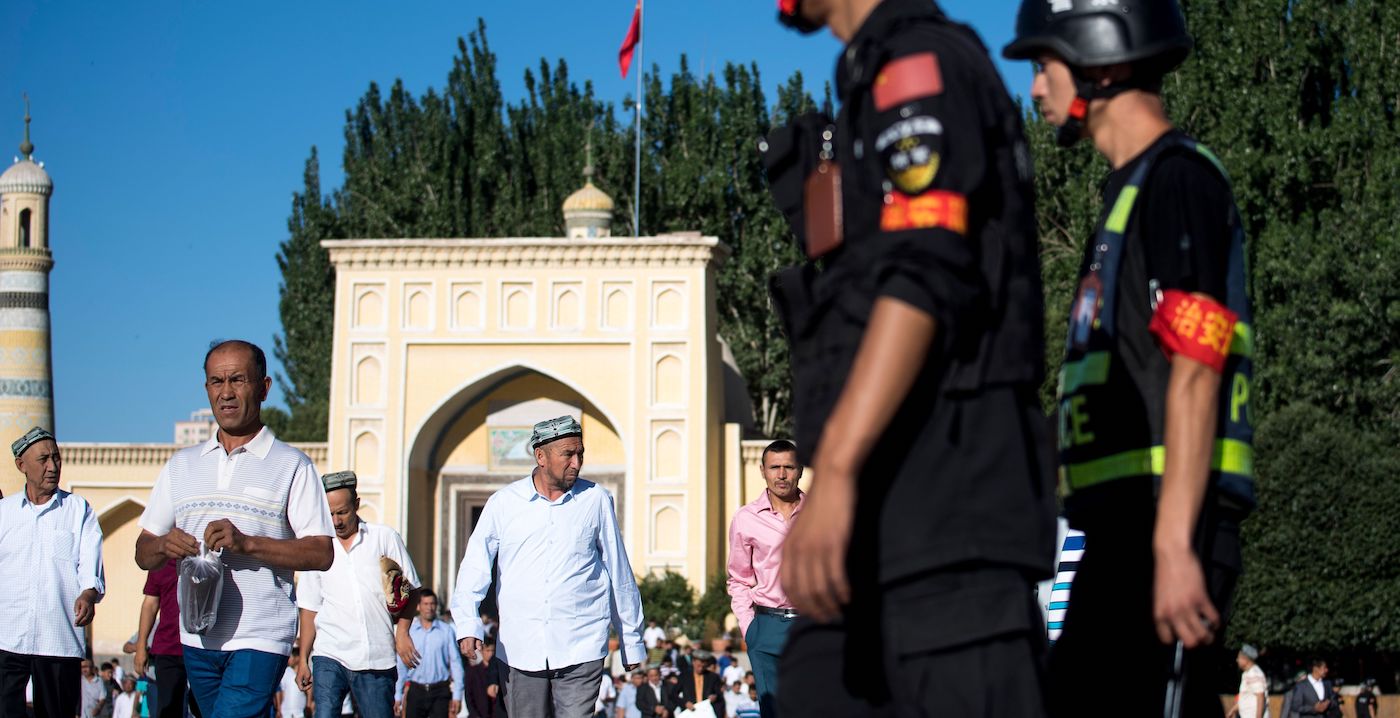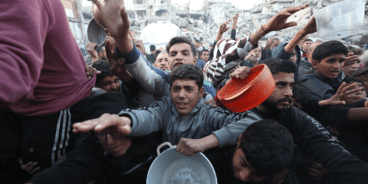

Atrocity Alert No. 362: China, Nicaragua and Afghanistan
Atrocity Alert is a weekly publication by the Global Centre for the Responsibility to Protect highlighting situations where populations are at risk of, or are enduring, mass atrocity crimes.
CHINA’S PRESIDENT XI JINPING INCENTIVIZES FURTHER SYSTEMATIC REPRESSION IN XINJIANG
Chinese President Xi Jinping made a surprise visit to the so-called Xinjiang Uyghur Autonomous Region (XUAR) on 26 August, his first publicly known visit to the region since July 2022 and only his second official trip since the expansion of his country’s systematic persecution of the ethnic Uyghur community, as well as Kazakhs, Kyrgyz and other majority-Muslim ethnic groups. Since 2017 the Chinese government and authorities in XUAR have increased persecution under the guise of combating religious extremism and terrorism. According to Chinese media, during his visit President Xi condoned the government’s discriminatory practices, highlighting that social stability must remain a top priority, including through deepening efforts in controlling “illegal religious activities” and continued counterterrorism measures.
President Xi also stressed that “targeted efforts should be made to rebut any inaccurate and negative press.” This comment may have been alluding to the evidence that over 1 million people, mainly Uyghurs, have been arbitrarily detained in “re-education” or “de-extremification” facilities since 2017, with allegations of widespread rape, sexual abuse and torture in these facilities. Human rights organizations have also warned that approximately 100,000 Uyghurs are working under conditions that strongly suggest forced labor. In August 2022 the former UN High Commissioner for Human Rights determined that the extent of arbitrary and discriminatory detention may constitute crimes against humanity. The report also questioned the Chinese government’s claims that its policies are for counterterrorism purposes.
In response to mounting evidence of abuses against the Uyghurs and other majority-Muslim ethnic communities, several governments have individually recognized the situation in XUAR as constituting genocide and/or crimes against humanity, sanctioned Chinese government officials or taken steps to ban goods tied to Uyghur forced labor. Yet, following a visit to XUAR in mid-August by a 25-state delegation from the Organization of Islamic Cooperation (OIC), Chinese media quoted some of the representatives as having praised “the prosperity and development of XUAR under good governance,” as well as the “remarkable transformation of XUAR,” which will “help to address the misconceptions attached with the region.” The lack of coordinated and consistent international pressure has so far only emboldened Chinese government officials to continue systematic persecution, as illustrated in President Xi’s latest public statements.
An initiative by western governments to ensure formal discussions on the UN High Commissioner’s findings at the Human Rights Council (HRC) was rejected by a narrow margin in October 2022. However, it constituted an important first step to signal enhanced global attention on abuses perpetrated by Chinese authorities and put pressure on HRC members – including members of the OIC – to go on public record refusing to support such a debate. The upcoming 54th HRC session provides an important opportunity to revitalize pressure on the Chinese government and its supporters and demonstrate that no country committing atrocity crimes can permanently shield itself from scrutiny.
NICARAGUA INTENSIFIES PERSECUTION OF THE CATHOLIC CHURCH
On 23 August the Nicaraguan government canceled the legal status of the Jesuit religious community, ordering the confiscation of its property due to alleged mis-compliance with tax reporting. Days before, state authorities seized Universidad Centroamericana, a prestigious Jesuit-run university which the government had labeled as a “center for terrorism,” marking the 26th university shut down since December 2021. The two actions are part of a pattern of intensifying repressive actions by the government directed towards the Catholic Church. The Office of the UN High Commissioner for Human Rights (OHCHR) warned during July that “the persecution of members of the Catholic church has intensified,” including through harassment and intimidation of priests. Nicaraguan human rights organizations have warned that at least 50 religious leaders have fled the country since 2018, although actual numbers are expected to be much higher.
While President Daniel Ortega first invited the Catholic Church to mediate national dialogue in response to the brutal state-led crackdown of street protests in April 2018, religious leaders and institutions have since become one of the primary targets of persecution. The persecution of religious leaders and wider repression of civic space has enabled President Ortega’s administration to commit crimes against humanity, including murder, imprisonment, torture and sexual violence, in a context of pervasive impunity. According to OHCHR, more than 3,000 non-governmental organizations have been forcibly shut down since December 2018, while at least 119 civil society organizations and eight universities have had their legal status canceled between March and July 2023 alone. The UN Human Rights Council (HRC)-mandated Group of Human Rights Experts on Nicaragua has alleged that these measures are part of a systematic campaign to “eliminate, by different means, any opposition in the country.”
In response to the government’s escalating restrictions on civic space and the seizure of Universidad Centroamericana, on 19 August the United States (US) Department of State announced the imposition of travel bans against 100 Nicaraguan officials “who restrict Nicaragua’s human rights and undermine democracy.” The US also called on the government to release “unjustly detain[ed] courageous individuals,” including Bishop Rolando Álvarez, a prominent Catholic leader.
While this decision sends an important signal to perpetrators, the international community has so far failed to apply a coordinated, holistic and robust strategy to respond to Nicaragua’s descent into authoritarianism and systematic attempts to silence dissent. States from all regions should work on a joint action plan to identify leverage points to pressure the Ortega government to lift restrictions on civic space, end state-led repression and re-engage with the multilateral system. At the upcoming 54th session of the HRC, states should give maximum visibility to the deteriorating crisis in Nicaragua and call on the government to immediately halt intensifying persecution of dissenting voices.
TALIBAN PERPETRATE GRAVE HUMAN RIGHTS VIOLATIONS AGAINST FORMER AFGHAN OFFICIALS
The Taliban de facto authorities in Afghanistan have perpetrated serious human rights violations against hundreds of former government officials and armed forces, according to a new report from the Human Rights Service of the UN Assistance Mission in Afghanistan (UNAMA). Despite an announcement and repeated assurances from the Taliban de facto authorities of a “general amnesty” for individuals affiliated with the former government and its security forces, UNAMA documented over 800 instances of extrajudicial killings, arbitrary arrests and detentions, enforced disappearances and torture and ill-treatment perpetrated by the Taliban from 15 August 2021 to 30 June 2023. These violations were carried out against former members of the Afghan National Defense and Security Forces, including the Afghan National Army and Afghan National and Local Police, in all 34 provinces of Afghanistan.
UNAMA’s report also outlined how the de facto authorities carried out the violations. Men that were initially “arrested” by the Taliban have often been found dead days or weeks later from extrajudicial killings. The bodies of persons that had been forcibly disappeared would be suddenly found or handed over to family members by the Taliban, with no explanation regarding the person’s disappearance and death. The documented instances of torture and ill-treatment include beatings with pipes and cables, as well as verbal threats and abuse.
In response to the report, which was released on 22 August, the UN High Commissioner for Human Rights, Volker Türk, said, “UNAMA’s report presents a sobering picture of the treatment of individuals affiliated with the former government and security forces of Afghanistan since the Taliban takeover of the country. Even more so, given they were assured that they would be not targeted, it is a betrayal of the people’s trust.”
According to the report, there have been limited efforts by the de facto authorities to investigate the reported violations and hold perpetrators accountable, allowing impunity to prevail. The UN Special Representative of the Secretary-General for Afghanistan and Head of UNAMA, Roza Otunbayeva, said, “The de facto authorities must demonstrate a genuine commitment to the general amnesty. This is a crucial step in ensuring real prospects for justice, reconciliation and lasting peace in Afghanistan.” An official written response by the de facto Ministry of Foreign Affairs (Directorate of Human Rights and Women’s International Affairs) in Afghanistan was attached to the report. The response denied the documented cases, emphasizing that, “No military staff of the previous administration has been arrested, detained or tortured because of his activities in the security institutions.”
Extrajudicial killings, arbitrary arrests, detentions, torture and ill-treatment of former government officials and armed forces perpetrated by the Taliban de facto authorities are contrary to obligations laid out in international human rights treaties to which Afghanistan is a party. The Taliban de facto authorities must take steps to ensure they uphold all existing international human rights obligations, including by promptly, credibly and impartially investigating all alleged human rights violations and holding those responsible to account where appropriate.
Related Content


Populations at Risk, March 2025
